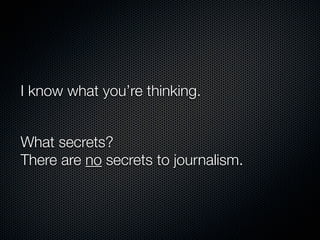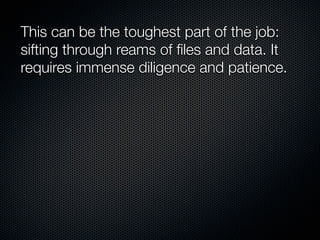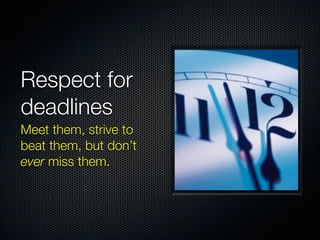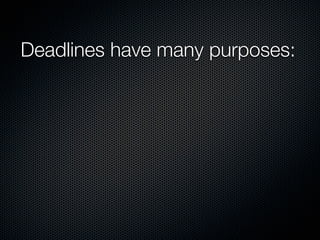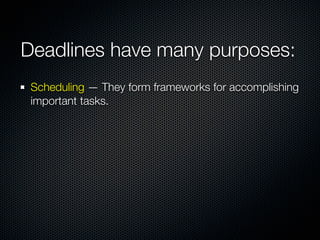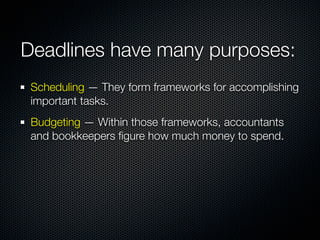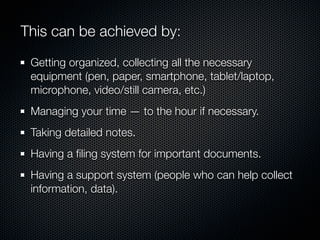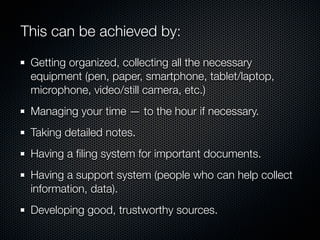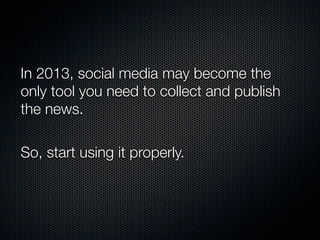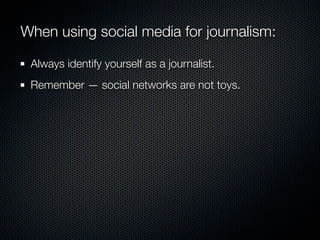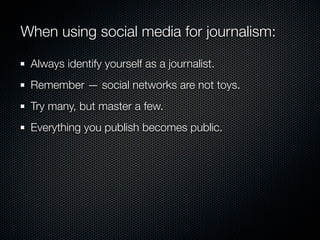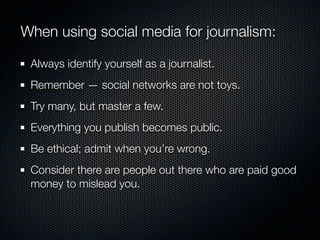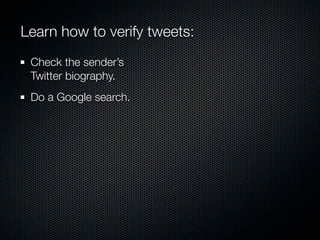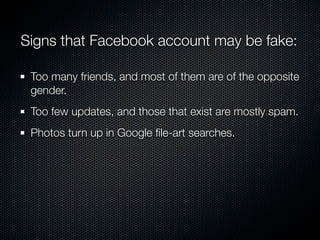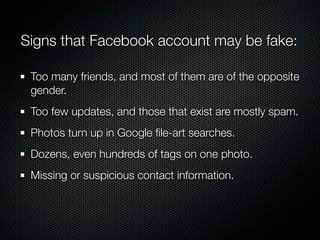The Secrets of Great Journalism
- 1. The Secrets of Great Journalism David Sheets, former newspaper content editor; past-president, St. Louis Pro Chapter, Society of Professional Journalists
- 2. I know what you’re thinking.
- 3. I know what you’re thinking. What secrets? There are no secrets to journalism.
- 4. All you have to do is this:
- 5. All you have to do is this: Just show up and go to work, right?
- 6. That’s why so many people today think they can be journalists overnight.
- 7. That’s why so many people today think they can be journalists overnight. The end result of journalism is obvious. The amount of work required for it is not.
- 8. So, before considering a career in journalism, consider everything that goes into doing it ...
- 9. Good writing
- 10. Good writing You can’t tell a story or convey a message unless you do it clearly, concisely.
- 11. Becoming a good writer requires doing a lot of this ...
- 12. Becoming a good writer requires doing a lot of this ...
- 13. Why?
- 14. Why? Because the only way to know how words work is by seeing them in action, in books, magazines, newspapers ... everything.
- 15. So, if you’re not a reader, but you want everyone to respect your writing, get into the habit of reading.
- 16. So, if you’re not a reader, but you want everyone to respect your writing, get into the habit of reading. Now.
- 17. Strong curiosity
- 18. Strong curiosity Show an interest in everything around you; be nosy.
- 19. Pay special attention to:
- 20. Pay special attention to: Who, What, When, Where, Why, How, and my personal favorites: Who cares? So what?
- 21. Pay special attention to: Who, What, When, Where, Why, How, and my personal favorites: Who cares? So what? Color, size, shape, location, sound, aroma, texture, mood, behavior.
- 22. Pay special attention to: Who, What, When, Where, Why, How, and my personal favorites: Who cares? So what? Color, size, shape, location, sound, aroma, texture, mood, behavior. Looking past the obvious.
- 23. Pay special attention to: Who, What, When, Where, Why, How, and my personal favorites: Who cares? So what? Color, size, shape, location, sound, aroma, texture, mood, behavior. Looking past the obvious. The potential for surprise and shock.
- 24. Of course, the talent of paying attention requires that you develop a second habit ...
- 26. The ability to listen Keep your ears open, your attention focused, and your mouth shut.
- 27. Sometimes, that’s a tough thing to do.
- 28. Sometimes, that’s a tough thing to do. People love to talk at length about themselves; that’s their favorite subject.
- 29. Sometimes, that’s a tough thing to do. People love to talk at length about themselves; that’s their favorite subject. Listen, anyway. Guide the conversation, if you must (‘That’s interesting, but ...’). Somewhere in the middle is the golden detail you seek.
- 31. Fearless research Rock-solid, thorough background detail is at the foundation of good journalism.
- 32. This can be the toughest part of the job: sifting through reams of files and data. It requires immense diligence and patience.
- 33. This can be the toughest part of the job: sifting through reams of files and data. It requires immense diligence and patience. It also requires more than a Google search.
- 34. This can be the toughest part of the job: sifting through reams of files and data. It requires immense diligence and patience. It also requires more than a Google search. Get comfortable with sites such as PACER, Pipl, and Portico, and learn how to do advanced searches on Facebook and LinkedIn.
- 36. Respect for deadlines Meet them, strive to beat them, but don’t ever miss them.
- 37. Deadlines have many purposes:
- 38. Deadlines have many purposes: Scheduling — They form frameworks for accomplishing important tasks.
- 39. Deadlines have many purposes: Scheduling — They form frameworks for accomplishing important tasks. Budgeting — Within those frameworks, accountants and bookkeepers figure how much money to spend.
- 40. Deadlines have many purposes: Scheduling — They form frameworks for accomplishing important tasks. Budgeting — Within those frameworks, accountants and bookkeepers figure how much money to spend. Managing — They are the easiest tools for bosses to determine whether you’re professional enough for the job of journalism.
- 41. Miss a deadline or two, or more, and a couple of things could happen:
- 42. Miss a deadline or two, or more, and a couple of things could happen: You’ll be fired.
- 43. Miss a deadline or two, or more, and a couple of things could happen: You’ll be fired. You’ll be labeled as untrustworthy, receive only boring assignments, and your input will be ignored no matter its value. (Worse, colleagues may steal your ideas and get all the credit for them.)
- 44. Strong planning
- 45. Strong planning Don’t just hope things will work out. Figure out what to do before doing anything.
- 46. This can be achieved by:
- 47. This can be achieved by: Getting organized, collecting all the necessary equipment (pen, paper, smartphone, tablet/laptop, microphone, video/still camera, etc.)
- 48. This can be achieved by: Getting organized, collecting all the necessary equipment (pen, paper, smartphone, tablet/laptop, microphone, video/still camera, etc.) Managing your time — to the hour if necessary.
- 49. This can be achieved by: Getting organized, collecting all the necessary equipment (pen, paper, smartphone, tablet/laptop, microphone, video/still camera, etc.) Managing your time — to the hour if necessary. Taking detailed notes.
- 50. This can be achieved by: Getting organized, collecting all the necessary equipment (pen, paper, smartphone, tablet/laptop, microphone, video/still camera, etc.) Managing your time — to the hour if necessary. Taking detailed notes. Having a filing system for important documents.
- 51. This can be achieved by: Getting organized, collecting all the necessary equipment (pen, paper, smartphone, tablet/laptop, microphone, video/still camera, etc.) Managing your time — to the hour if necessary. Taking detailed notes. Having a filing system for important documents. Having a support system (people who can help collect information, data).
- 52. This can be achieved by: Getting organized, collecting all the necessary equipment (pen, paper, smartphone, tablet/laptop, microphone, video/still camera, etc.) Managing your time — to the hour if necessary. Taking detailed notes. Having a filing system for important documents. Having a support system (people who can help collect information, data). Developing good, trustworthy sources.
- 53. And speaking of sources, it’s crucial these days to have ...
- 55. Social media expertise Because networking is an essential reporting tool.
- 56. When I started out, this was all you needed:
- 57. When I started out, this was all you needed:
- 58. And one of these:
- 59. And one of these:
- 60. Now, all those things, and more, fit into one of these:
- 61. Now, all those things, and more, fit into one of these:
- 62. In 2008, the phone function became the least-used part of a mobile phone.
- 63. In 2008, the phone function became the least-used part of a mobile phone. In 2010, social media became the most-used function.
- 64. In 2011, social media proved its value as a reporting tool when it was used to break news of the Arab Spring uprisings in the Middle East.
- 65. In 2011, social media proved its value as a reporting tool when it was used to break news of the Arab Spring uprisings in the Middle East. In 2012, social media outpaced the major media in breaking-news coverage of the presidential election campaign.
- 66. In 2013, social media may become the only tool you need to collect and publish the news.
- 67. In 2013, social media may become the only tool you need to collect and publish the news. So, start using it properly.
- 68. Build social interaction by:
- 69. Build social interaction by: Posting regularly
- 70. Build social interaction by: Posting regularly Creating a content calendar based on interests.
- 71. Build social interaction by: Posting regularly Creating a content calendar based on interests. Responding to posts, tweets.
- 72. Build social interaction by: Posting regularly Creating a content calendar based on interests. Responding to posts, tweets. Sharing links, to show people what you’re reading.
- 73. Build social interaction by: Posting regularly Creating a content calendar based on interests. Responding to posts, tweets. Sharing links, to show people what you’re reading. Starting chats / discussions with other journalists.
- 74. Build social interaction by: Posting regularly Creating a content calendar based on interests. Responding to posts, tweets. Sharing links, to show people what you’re reading. Starting chats / discussions with other journalists. Distributing original content.
- 75. Build social interaction by: Posting regularly Creating a content calendar based on interests. Responding to posts, tweets. Sharing links, to show people what you’re reading. Starting chats / discussions with other journalists. Distributing original content. Attending meetups and tweetups.
- 76. Build social interaction by: Posting regularly Creating a content calendar based on interests. Responding to posts, tweets. Sharing links, to show people what you’re reading. Starting chats / discussions with other journalists. Distributing original content. Attending meetups and tweetups. Asking for help, advice.
- 77. When using social media for journalism:
- 78. When using social media for journalism: Always identify yourself as a journalist.
- 79. When using social media for journalism: Always identify yourself as a journalist. Remember — social networks are not toys.
- 80. When using social media for journalism: Always identify yourself as a journalist. Remember — social networks are not toys. Try many, but master a few.
- 81. When using social media for journalism: Always identify yourself as a journalist. Remember — social networks are not toys. Try many, but master a few. Everything you publish becomes public.
- 82. When using social media for journalism: Always identify yourself as a journalist. Remember — social networks are not toys. Try many, but master a few. Everything you publish becomes public. Be ethical; admit when you’re wrong.
- 83. When using social media for journalism: Always identify yourself as a journalist. Remember — social networks are not toys. Try many, but master a few. Everything you publish becomes public. Be ethical; admit when you’re wrong. Consider there are people out there who are paid good money to mislead you.
- 84. When using social media for journalism: Always identify yourself as a journalist. Remember — social networks are not toys. Try many, but master a few. Everything you publish becomes public. Be ethical; admit when you’re wrong. Consider there are people out there who are paid good money to mislead you. Verify everything.
- 85. Learn how to verify tweets:
- 86. Learn how to verify tweets: Check the sender’s Twitter biography.
- 87. Learn how to verify tweets: Check the sender’s Twitter biography. Do a Google search.
- 88. Learn how to verify tweets: Check the sender’s Twitter biography. Do a Google search. Scrutinize sender’s other social media sites.
- 89. Learn how to verify tweets: Check the sender’s Twitter biography. Do a Google search. Scrutinize sender’s other social media sites. On breaking news, review timestamps.
- 90. Learn how to verify tweets: Check the sender’s Twitter biography. Do a Google search. Scrutinize sender’s other social media sites. On breaking news, review timestamps. Be mindful of user context.
- 91. Learn how to verify tweets: Check the sender’s Check the frequency Twitter biography. of tweets. Do a Google search. Scrutinize sender’s other social media sites. On breaking news, review timestamps. Be mindful of user context.
- 92. Learn how to verify tweets: Check the sender’s Check the frequency Twitter biography. of tweets. Do a Google search. Check for related tweets. Scrutinize sender’s other social media sites. On breaking news, review timestamps. Be mindful of user context.
- 93. Learn how to verify tweets: Check the sender’s Check the frequency Twitter biography. of tweets. Do a Google search. Check for related tweets. Scrutinize sender’s other Examine past tweets; social media sites. search for patterns in the sender’s stream. On breaking news, review timestamps. Be mindful of user context.
- 94. Learn how to verify tweets: Check the sender’s Check the frequency Twitter biography. of tweets. Do a Google search. Check for related tweets. Scrutinize sender’s other Examine past tweets; social media sites. search for patterns in the sender’s stream. On breaking news, review timestamps. Send a direct message. Be mindful of user context.
- 95. Signs that Facebook account may be fake:
- 96. Signs that Facebook account may be fake: Too many friends, and most of them are of the opposite gender.
- 97. Signs that Facebook account may be fake: Too many friends, and most of them are of the opposite gender. Too few updates, and those that exist are mostly spam.
- 98. Signs that Facebook account may be fake: Too many friends, and most of them are of the opposite gender. Too few updates, and those that exist are mostly spam. Photos turn up in Google file-art searches.
- 99. Signs that Facebook account may be fake: Too many friends, and most of them are of the opposite gender. Too few updates, and those that exist are mostly spam. Photos turn up in Google file-art searches. Dozens, even hundreds of tags on one photo.
- 100. Signs that Facebook account may be fake: Too many friends, and most of them are of the opposite gender. Too few updates, and those that exist are mostly spam. Photos turn up in Google file-art searches. Dozens, even hundreds of tags on one photo. Missing or suspicious contact information.
- 101. Signs that Facebook account may be fake: Too many friends, and most of them are of the opposite gender. Too few updates, and those that exist are mostly spam. Photos turn up in Google file-art searches. Dozens, even hundreds of tags on one photo. Missing or suspicious contact information. Birth dates on Jan. 1, or major holidays.
- 102. The Secrets of Great Journalism David Sheets Email: dksheets@gmail.com / Facebook: DKSheets LinkedIn: DKSheets / Twitter: @DKSheets
Editor's Notes
- \n
- \n
- \n
- \n
- \n
- \n
- \n
- \n
- \n
- \n
- \n
- \n
- \n
- \n
- \n
- \n
- \n
- \n
- \n
- \n
- \n
- \n
- \n
- \n
- \n
- \n
- \n
- \n
- \n
- \n
- \n
- \n
- \n
- \n
- \n
- \n
- \n
- \n
- \n
- \n
- \n
- \n
- \n
- \n
- \n
- \n
- \n
- \n
- \n
- \n
- \n
- \n
- \n
- \n
- \n
- \n
- \n
- \n
- \n
- \n
- \n
- \n
- \n
- \n
- \n
- \n
- \n
- \n
- \n
- \n
- \n
- \n
- \n
- \n
- \n
- \n
- \n
- \n


